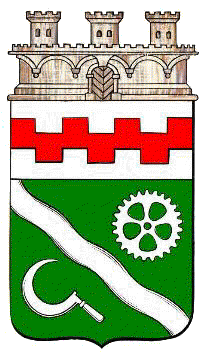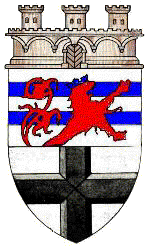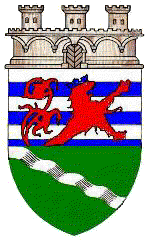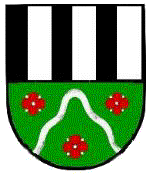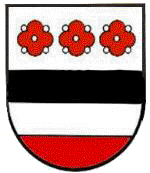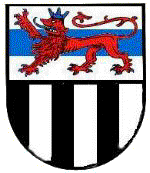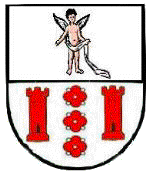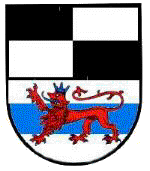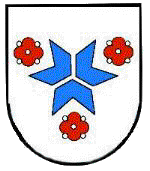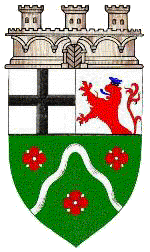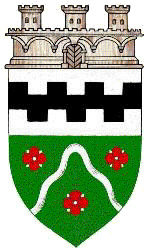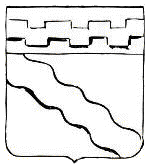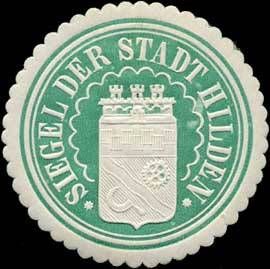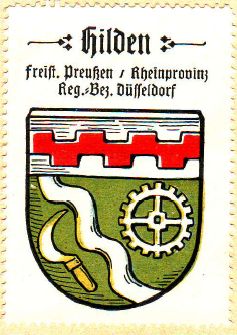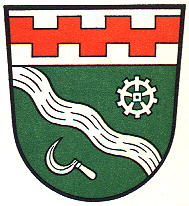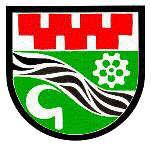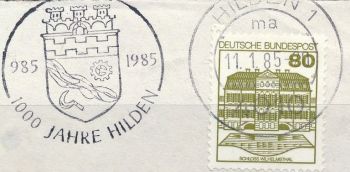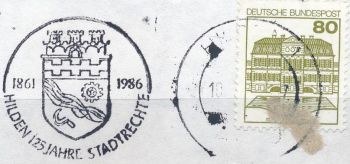Hilden: Difference between revisions
Knorrepoes (talk | contribs) m (Text replacement - ".gif|center]]" to ".gif|center|Arms of {{PAGENAME}}]]") |
Knorrepoes (talk | contribs) m (Text replacement - " :" to ":") |
||
| (28 intermediate revisions by the same user not shown) | |||
| Line 1: | Line 1: | ||
'''HILDEN''' | '''HILDEN''' | ||
State : [[Nordrhein-Westfalen]]<br/> | State: [[Nordrhein-Westfalen]]<br/> | ||
District (Kreis) : [[Mettmann (kreis)|Mettmann]] | District (Kreis): [[Mettmann (kreis)|Mettmann]] | ||
[[File:hilden1.gif|center|Wappen von {{PAGENAME}}]] | [[File:hilden1.gif|center|alt=Wappen von {{PAGENAME}}/Arms (crest) of {{PAGENAME}}]] | ||
= | {| class="wikitable" | ||
|+Official blazon | |||
|- | |||
|'''German''' | |||
| | |||
Unter silbernem Schildhaupt, darin ein roter Wechselzinnenbalken, in Grün ein silberner Schrägwellenbalken, begleitet oben von einem silbernen Kammrad unten von einer silbernen Sichel. Im Oberwappen eine dreitürmige silberne Mauerkrone mit geschlossenem schwarzen Tor. | Unter silbernem Schildhaupt, darin ein roter Wechselzinnenbalken, in Grün ein silberner Schrägwellenbalken, begleitet oben von einem silbernen Kammrad unten von einer silbernen Sichel. Im Oberwappen eine dreitürmige silberne Mauerkrone mit geschlossenem schwarzen Tor. | ||
|- | |||
|'''English''' | |||
| blazon wanted | |||
|} | |||
===Origin/meaning=== | |||
The arms were granted on April 2, 1900. | The arms were granted on April 2, 1900. | ||
| Line 20: | Line 27: | ||
{|align="center" | {|align="center" | ||
|align="center"|[[File:hilden03.gif|center|Arms of {{PAGENAME}}]] <br/>1st design by Frauberger | |align="center"|[[File:hilden03.gif|center|Arms (crest) of {{PAGENAME}}]] <br/>1st design by Frauberger | ||
|} | |} | ||
| Line 26: | Line 33: | ||
{|align="center" | {|align="center" | ||
|align="center"|[[File:hilden04.gif|center|Arms of {{PAGENAME}}]] <br/>2nd design by Frauberger | |align="center"|[[File:hilden04.gif|center|Arms (crest) of {{PAGENAME}}]] <br/>2nd design by Frauberger | ||
|} | |} | ||
| Line 35: | Line 42: | ||
{|align="center" | {|align="center" | ||
|align="center"|[[File:hilden05.gif|center|Arms of {{PAGENAME}}]] <br/>1st design by Wymar | |align="center"|[[File:hilden05.gif|center|Arms (crest) of {{PAGENAME}}]] <br/>1st design by Wymar | ||
|} | |} | ||
| Line 41: | Line 48: | ||
{|align="center" | {|align="center" | ||
|align="center"|[[File:hilden06.gif|center|Arms of {{PAGENAME}}]] <br/>2nd design by Wymar | |align="center"|[[File:hilden06.gif|center|Arms (crest) of {{PAGENAME}}]] <br/>2nd design by Wymar | ||
|} | |} | ||
| Line 47: | Line 54: | ||
{|align="center" | {|align="center" | ||
|align="center"|[[File:hilden07.gif|center|Arms of {{PAGENAME}}]] <br/>3rd design by Wymar | |align="center"|[[File:hilden07.gif|center|Arms (crest) of {{PAGENAME}}]] <br/>3rd design by Wymar | ||
|} | |} | ||
| Line 53: | Line 60: | ||
{|align="center" | {|align="center" | ||
|align="center"|[[File:hilden08.gif|center|Arms of {{PAGENAME}}]] <br/>4th design by Wymar | |align="center"|[[File:hilden08.gif|center|Arms (crest) of {{PAGENAME}}]] <br/>4th design by Wymar | ||
|} | |} | ||
| Line 59: | Line 66: | ||
{|align="center" | {|align="center" | ||
|align="center"|[[File:hilden09.gif|center|Arms of {{PAGENAME}}]] <br/>5th design by Wymar | |align="center"|[[File:hilden09.gif|center|Arms (crest) of {{PAGENAME}}]] <br/>5th design by Wymar | ||
|} | |} | ||
| Line 66: | Line 73: | ||
{|align="center" | {|align="center" | ||
|align="center"|[[File:hilden10.gif|center|Arms of {{PAGENAME}}]] <br/>6th design by Wymar | |align="center"|[[File:hilden10.gif|center|Arms (crest) of {{PAGENAME}}]] <br/>6th design by Wymar | ||
|} | |} | ||
| Line 74: | Line 81: | ||
{|align="center" | {|align="center" | ||
|align="center"|[[File:hilden11.gif|center|Arms of {{PAGENAME}}]] <br/>1st compromise design Harless/Wymar | |align="center"|[[File:hilden11.gif|center|Arms (crest) of {{PAGENAME}}]] <br/>1st compromise design Harless/Wymar | ||
|} | |} | ||
| Line 80: | Line 87: | ||
{|align="center" | {|align="center" | ||
|align="center"|[[File:hilden12.gif|center|Arms of {{PAGENAME}}]] <br/>2nd compromise design Harless/Wymar | |align="center"|[[File:hilden12.gif|center|Arms (crest) of {{PAGENAME}}]] <br/>2nd compromise design Harless/Wymar | ||
|} | |} | ||
| Line 86: | Line 93: | ||
{|align="center" | {|align="center" | ||
|align="center"|[[File:hilden13.gif|center|Arms of {{PAGENAME}}]] <br/>Proposal by the Royal Herald of Arms Office in Berlin, dated October 9, 1899 | |align="center"|[[File:hilden13.gif|center|Arms (crest) of {{PAGENAME}}]] <br/>Proposal by the Royal Herald of Arms Office in Berlin, dated October 9, 1899 | ||
|} | |} | ||
| Line 93: | Line 100: | ||
{|align="center" | {|align="center" | ||
|align="center"|[[File:{{PAGENAME}}z1.jpg|center|Siegel von {{PAGENAME}}]] <br/>Seal from around 1900 | |align="center"|[[File:{{PAGENAME}}z1.jpg|center|Siegel von {{PAGENAME}}]] <br/>Seal from around 1900 | ||
|align="center"|[[File:hilden.hagd.jpg|center|Wappen von {{PAGENAME}}]] <br/>The arms by [[Otto Hupp|Hupp]] in the [[Kaffee Hag albums]] +/- 1925 | |align="center"|[[File:hilden.hagd.jpg|center|Wappen von {{PAGENAME}}/Coat of arms (crest) of {{PAGENAME}}]] <br/>The arms by [[Otto Hupp|Hupp]] in the [[Kaffee Hag albums]] +/- 1925 | ||
|- | |- | ||
|align="center"|[[File:hilden.jpg|center]] <br/>The arms used after the second world war until the 1980s (the mural crown was omitted) | |align="center"|[[File:hilden.jpg|center|Wappen von {{PAGENAME}}/Coat of arms (crest) of {{PAGENAME}}]] <br/>The arms used after the second world war until the 1980s (the mural crown was omitted) | ||
|align="center"|[[File:hilden17.gif|center|Arms of {{PAGENAME}}]] <br/>Abstract design by Hans-Karl Rodenkirchen (HAKARO), around 1985 | |align="center"|[[File:hilden17.gif|center|Arms (crest) of {{PAGENAME}}]] <br/>Abstract design by Hans-Karl Rodenkirchen (HAKARO), around 1985 | ||
|- | |||
|align="center"|[[File:{{PAGENAME}}p1.jpg|center|350 px|Coat of arms (crest) of {{PAGENAME}}]] <br/>The arms on a special cancellation 1985 | |||
|align="center"|[[File:{{PAGENAME}}p2.jpg|center|350 px|Coat of arms (crest) of {{PAGENAME}}]] <br/>The arms on a special cancellation 1986 | |||
|} | |} | ||
{{de}} | |||
{{media}} | {{media}} | ||
[[Literature]] : Stadler, 1964-1971, 8 volumes; designs and info taken from http://www.isis.de/members/~ksieger/stadtwap/stadtwgb | [[Civic Heraldry Literature - Germany|'''Literature''']]: Stadler, 1964-1971, 8 volumes; designs and info taken from http://www.isis.de/members/~ksieger/stadtwap/stadtwgb | ||
[[Category:German Municipalities H]] | [[Category:German Municipalities H]] | ||
Latest revision as of 11:28, 11 August 2024
HILDEN
State: Nordrhein-Westfalen
District (Kreis): Mettmann
| German |
Unter silbernem Schildhaupt, darin ein roter Wechselzinnenbalken, in Grün ein silberner Schrägwellenbalken, begleitet oben von einem silbernen Kammrad unten von einer silbernen Sichel. Im Oberwappen eine dreitürmige silberne Mauerkrone mit geschlossenem schwarzen Tor. |
| English | blazon wanted |
Origin/meaning
The arms were granted on April 2, 1900.
The city does not have old historical arms. It belonged to Haan and the only seal of Haan and Hilden shows the patron saint. The upper part of the arms show the oldest arms of the counts of Berg, which was later replaced by the, more often used, lion (see the county arms). The lower part is based on the arms of the Prussian Rhine Province, but the river here is the Itter. The sickle and wheel symbolise agriculture and industry.
The history of the arms of Hilden is rather complex. Hilden was declared a town in 1861. Thirtyfour years later, on October 2, 1895, the municipal council decided to apply for coat of arms.
On January 24, 1896, Frauberger, general manager of a Düsseldorf industry association presented his first designs to Hilden's municipal administration:
| 1st design by Frauberger |
This was the official design. The shield is divided into two parts. The upper part shows the lion of the Counts of Berg, backed by two blue bars, representing the Knights of Horst. The lower part shows the cross of the State of Köln, as Hilden was the property of the Archbishop of Köln in the 13th century.
| 2nd design by Frauberger |
This was an inofficial design, only to please council member Lieven, who had contacted Frauberger. But this is the first design to show the River Itter.
Dr. Woldemar Harless, Düsseldorf Privy Counseller of Archives, however had the opinion, that the River Itter could be mixed up with the River Rhine.
The Hilden municipal council, headed by the just appointed mayor Karl Wilhelm Heitland on January 28, 1896 had its first meeting on the coat of arms, but no decision was taken. On April 7, 1896, council member Karl Bergmann handed six new designs to the mayor. These designs had been painted by an employee of a Hilden cotton company, Peter Wymar. Wymar's designs do not exist in the Hilden archives, but the following reconstructions may give an idea, how Wymar's designs may have looked.
| 1st design by Wymar |
The upper part of the shield shows the colors of the Hohenzollern, hinting to Prussion rule. The lower part shows the river Itter. The three flowers represent trade, industry and agriculture.
| 2nd design by Wymar |
The upper part of the shield shows three flowers, standing for trade, industry and agriculture. The lower part shows the colours of the German national flag at that time.
| 3rd design by Wymar |
The upper part of the shield shows the lion of the Counts of Berg, backed by a blue bar, representing the Knights of Horst. The lower part shows the colours of the Hohenzollern.
| 4th design by Wymar |
The upper part of the shield shows a winged genius. The lower part shows two towers standing for the Catholic and Protestant faith and in between three flowers for trade, industry and agriculture.
| 5th design by Wymar |
The upper part of the shield shows the colours of the Hohenzollern. The lower part shows the lion of the Counts of Berg, backed by a blue bar, representing the Knights of Horst.
| 6th design by Wymar |
The blue star, divided into three segments represents the river Itter. The red flowers in its angles stay for trade, industry and agriculture.
Until 1899 there had been long discussions between the mayor, the council members and the local government in Düsseldorf about the arms. As a result Wymar painted two new designs as a compromise. The ultimate arrangement of symbols was proposed by the Royal Herald's Office in Berlin.
| 1st compromise design Harless/Wymar |
The upper part of the shield shows the lion of the Counts of Berg and the cross of Köln. The lower part shows the river Itter and three flowers for trade, industry and agriculture.
| 2nd compromise design Harless/Wymar |
The upper part of the shield shows a bar taken from the oldest arms of the Counts of Berg. The lower part shows the river Itter. The three flowers represent trade, industry and agriculture.
| Proposal by the Royal Herald of Arms Office in Berlin, dated October 9, 1899 |
Finally in 1900 again a new design was finally approved (present arms, see above).
| Seal from around 1900 |
The arms by Hupp in the Kaffee Hag albums +/- 1925 |
| The arms used after the second world war until the 1980s (the mural crown was omitted) |
Abstract design by Hans-Karl Rodenkirchen (HAKARO), around 1985 |
| The arms on a special cancellation 1985 |
The arms on a special cancellation 1986 |
This page is part of the German heraldry portal Deutsche Wappensammlung |
Heraldry of the World |
|
German heraldry:
|
Selected collector's items from Germany:
|
Contact and Support
Partners:
Your logo here ?
Contact us
© since 1995, Heraldry of the World, Ralf Hartemink 
Index of the site
Literature: Stadler, 1964-1971, 8 volumes; designs and info taken from http://www.isis.de/members/~ksieger/stadtwap/stadtwgb
